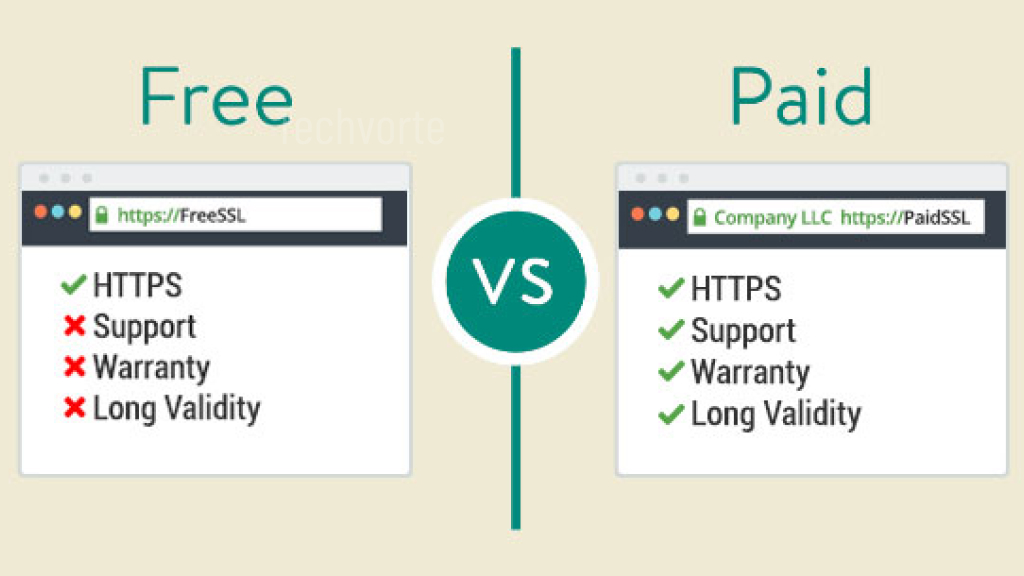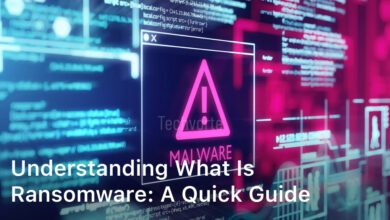SSL certificates are an essential component of website security and trustworthiness, providing encrypted communication between websites and their visitors.
There are two main types of SSL certificates: free and paid. While both provide similar functionality, there are crucial differences that website owners should consider when choosing which one to use.
In this article, we will explain the key differences between free SSL and paid SSL certificates.
We will discuss the importance of SSL certificates for website security and trustworthiness and explore the pros and cons of each type.
Whether you’re a website owner or just curious about SSL certificates, this article will provide you with the information you need to make an informed decision.

What is SSL?
SSL, or Secure Socket Layer, is a protocol used for establishing a secure and encrypted connection between a web server and a visitor’s web browser.
It provides a barrier against unauthorized access, ensuring that sensitive data like passwords, credit card details, and personal information are transmitted securely over the web.
SSL works by encrypting the data transferred between the server and the browser, making it unreadable to anyone who might intercept it.
This encryption is achieved through the use of cryptographic algorithms that scramble the data in transit, making it virtually impossible to decrypt without the key.
Since SSL was introduced, it has become an essential tool for securing online communications and building trust with visitors.
By using SSL, website owners can demonstrate a commitment to the security and privacy of their visitors, which can help increase user confidence and reduce the risk of data breaches.
Free SSL Certificates
Free SSL certificates have become increasingly popular, thanks to providers like Let’s Encrypt.
These certificates offer basic security features that are suitable for small websites or personal blogs.
However, they come with several limitations and require a careful validation process.
| Pros | Cons |
|---|---|
| Free to use | Limited features compared to paid SSL certificates |
| Can be obtained easily | May not provide extended validation |
| Suitable for non-commercial websites | May not be compatible with all browsers or devices |
The validation process for obtaining a free SSL certificate involves proving ownership of the website domain.
This can be done through email verification or by uploading a specific file to the website server.
While these steps may seem simple enough, they can be time-consuming and require some technical knowledge.
In summary, free SSL certificates are a good starting point for small websites or personal blogs.
However, for commercial websites or those with more advanced security needs, paid SSL certificates may be a better option.
Paid SSL Certificates
If you want to take your website’s security to the next level, paid SSL certificates are the way to go.
With paid SSL providers, you get access to premium features that are not available with free SSL certificates.
Extended Validation
Many paid SSL providers offer extended validation, which is a rigorous validation process that verifies the identity of the certificate holder.
When visitors see the green address bar, they know that your site has undergone this extra level of scrutiny and can trust that their information is secure.
Premium Features
Paid SSL certificates also come with premium features such as daily malware scans, vulnerability assessments, and warranties that cover financial loss in case of a breach.
These features give you added peace of mind and help you stay ahead of potential security threats.
Customer Support
Unlike free SSL providers, paid SSL certificate providers offer dedicated customer support to help you with any issues that may arise.
This can be especially helpful for those who are new to SSL certificates or have more complex websites.
| Paid SSL Certificates | Free SSL Certificates | |
|---|---|---|
| Validation process | Extended validation process verifies the certificate holder’s identity | Basic validation process does not verify the certificate holder’s identity |
| Premium features | Daily malware scans, vulnerability assessments, and financial loss warranties | Limited features |
| Customer support | Dedicated customer support | No dedicated customer support |
Factors to Consider When Choosing SSL Certificates
Choosing the right SSL certificate is crucial to ensuring the security and trustworthiness of your website.
Here are some key factors to consider:
Certificate Authority
It’s essential to choose an SSL certificate from a reputable certificate authority (CA).
This ensures that your website is trusted by web browsers and visitors can feel confident that their data is protected.
Level of Security
The level of security offered by an SSL certificate depends on the encryption method used.
A higher level of encryption provides more protection against hackers and cyber attacks.
Compatibility
It’s important to consider the compatibility of an SSL certificate with different browsers and devices.
Make sure to choose an SSL certificate that is compatible with all the platforms your website uses.
Cost
The cost of an SSL certificate varies depending on the level of security and features offered.
While free SSL certificates are available, paid SSL certificates typically offer better security and additional features like customer support and extended validation.
| Factor to Consider | Importance |
|---|---|
| Certificate Authority | High |
| Level of Security | High |
| Compatibility | Medium |
| Cost | Medium |
Consider these factors carefully when selecting an SSL certificate to ensure that your website is secure and trustworthy.
Choosing the Right SSL for Your Website
When deciding between free and paid SSL certificates, it’s essential to consider your website’s specific needs and requirements.
Factors to Consider When Choosing Between Free and Paid SSL
- Security requirements: Assess the level of security needed for your website based on the type of data you handle and the sensitivity of your transactions.
- Trust and credibility: Consider the importance of trust and credibility in your industry and whether displaying visual indicators of security is essential for your website visitors.
- Budget constraints: Evaluate your budget and weigh the costs and benefits of free and paid SSL options in terms of long-term value and return on investment.
Conclusion
Choosing between free SSL and paid SSL certificates can have a significant impact on your website’s security and trustworthiness.
While free SSL certificates are an excellent option for those on a tight budget, they come with limited features and a less rigorous validation process.
On the other hand, paid SSL certificates offer advanced security features, extended validation and exceptional customer support.
When selecting an SSL certificate, it is essential to consider the reputation of the certificate authority, the level of security offered, compatibility with different browsers and devices and the cost involved.
Ultimately, your choice will depend on your specific needs and the budget you have allocated for website security.
Remember, website security is critical for building trust with your visitors and protecting their data.
By investing in the right SSL certificate, you can ensure your website remains secure and trustworthy for years to come.
FAQ
What is the difference between free SSL and paid SSL certificates?
Free SSL certificates are provided by certain organizations, such as Let’s Encrypt, at no cost. They offer basic encryption for securing website communications. Paid SSL certificates, on the other hand, are purchased from reputable certificate authorities and come with additional features like extended validation and premium customer support.
Why is an SSL certificate important for website security?
An SSL certificate plays a crucial role in website security by encrypting the data that is transferred between a website and its visitors. This ensures that sensitive information such as login credentials, credit card details, and personal data remains private and protected from unauthorized access.
How does SSL work?
SSL (Secure Socket Layer) works by establishing an encrypted connection between a web server and a user’s browser. This encryption ensures that all data transferred between the two parties remains secure and protected from eavesdropping or tampering.
Can I get a free SSL certificate for my website?
Yes, there are several providers, such as Let’s Encrypt, that offer free SSL certificates. However, it’s important to note that these free certificates may come with limitations in terms of features and validation processes. Paid SSL certificates often provide additional benefits and stronger security.
What factors should I consider when choosing an SSL certificate?
When selecting an SSL certificate, it’s important to consider factors such as the reputation and trustworthiness of the certificate authority, the level of security offered by the certificate, compatibility with different browsers and devices, and the cost involved.





